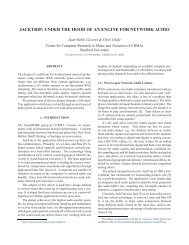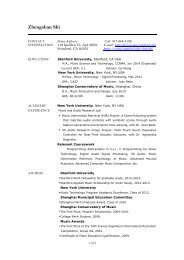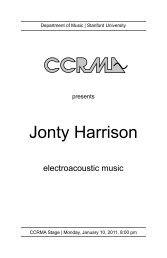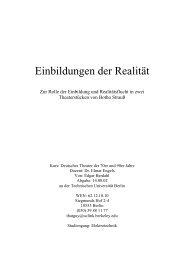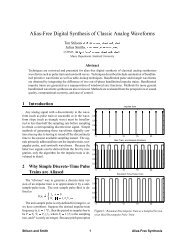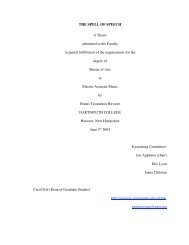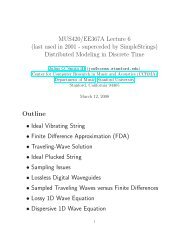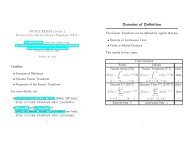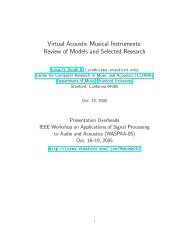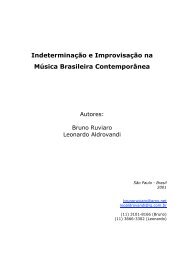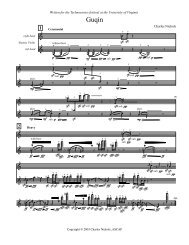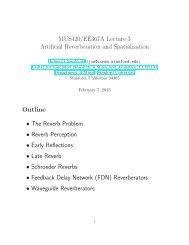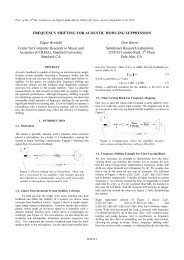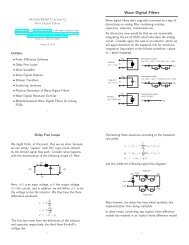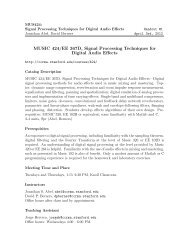CCRMA OVERVIEW - CCRMA - Stanford University
CCRMA OVERVIEW - CCRMA - Stanford University
CCRMA OVERVIEW - CCRMA - Stanford University
You also want an ePaper? Increase the reach of your titles
YUMPU automatically turns print PDFs into web optimized ePapers that Google loves.
Hands on participation will use the Max programming environment and Common Music, a language<br />
that runs on Macintosh, PC and Unix based platforms. It will also involve real-time interaction<br />
using the Mathews-Boie Radio Baton (MIDI conductor/controller device). This course is<br />
particularly geared towards performers with an interest in interactive performance, improvisation<br />
and other ventures into the world of music technology. Emphasis will be on group performance<br />
projects, composition of new works, and realizations of existing interactive works.<br />
• Introduction to Sound Synthesis and Signal Processing Using CLM<br />
This is an introductory and fast-paced workshop in sound synthesis techniques and digital audio<br />
effects, and their implementation in the CLM (Common Lisp Music) environment. We design<br />
software instruments that implement additive synthesis, subtractive, FM, sampling, wavetables,<br />
granular, spectral and physical modeling synthesis; and digital effects algorithms such as phasing,<br />
flanging, chorus, distortion and reverberation. Introductory signal processing and perception topics<br />
will be included.<br />
Common Lisp Music (CLM) is a public domain sound design language written on top of Common<br />
Lisp, currently running in Macintosh PowerPCs and several UNIX environments including SGI.<br />
Sun, NeXT and PC : s running Linux. The workshop includes a Common Lisp lab that will teach<br />
basic Lisp programming skills. Familiarity with computers and programming languages is helpful<br />
but programming proficiency is not required.<br />
• Introduction to Computer-Based Composition<br />
This course introduces basic principles and techniques of algorithmic composition and covers such<br />
topics as object oriented music representation, chance composition, musical automata and pattern<br />
languages. Sound synthesis used in the course material will include MIDI and Common Lisp Music.<br />
The course will be taught using the Common Music environment on Mac and NeXT workstations.<br />
The workshop will be divided into morning lectures and afternoon lab times. During the lab<br />
hours the students will gain a hands-on experience working through projects and examples first<br />
presented in the morning lecture. All source code and documents from the workshop are free<br />
to take. Participation in Introduction to Sound Synthesis workshop or familiarity with Lisp is<br />
necessary for taking the workshop. Other prior programming experience is useful but not required.<br />
• Computers in Music Scholarship (Music Theory, Analysis, History, Ethnomusicology)<br />
This course provides a comprehensive introduction to computer-assisted music research using the<br />
Humdrum Toolkit. Participants will learn to manipulate computer-based scores, tablatures, and<br />
other documents in order to solve a wide variety of analytic problems. By way of example, participants<br />
will learn to characterize common patterns of orchestration in Beethoven symphonies,<br />
examine harmony and voice-leading in Bach chorales, and investigate text/melody relationships in<br />
Gregorian chant.<br />
Thousands of full scores will be available for processing on-line - including repertoires from various<br />
cultures, periods, and genres. The course will be of particular value to scholars contemplating<br />
graduate level or advanced music research projects. The seminar staff will provide individual<br />
advice on participants' own research projects.<br />
All software and documentation from the workshop (including a sizeable score database) are free to<br />
take. The software is available for UNIX, DOS, OS/2 and Windows-95 (some restrictions apply).<br />
Familiarity with the 'emacs' or 'vi' text editors is recommended; limited knowledge of UNIX is<br />
helpful.<br />
• Intensive Audio Digital Signal Processing<br />
This weekend-length workshop is specifically designed for engineers or developers working with<br />
audio who are interested in deepening their background in digital audio theory. The workshop<br />
covers the use of the Fast Fourier Transform (FFT) in digital signal processing, focusing on practical<br />
spectrum analysis, sound synthesis with spectral models, and signal processing using the FFT.<br />
13



